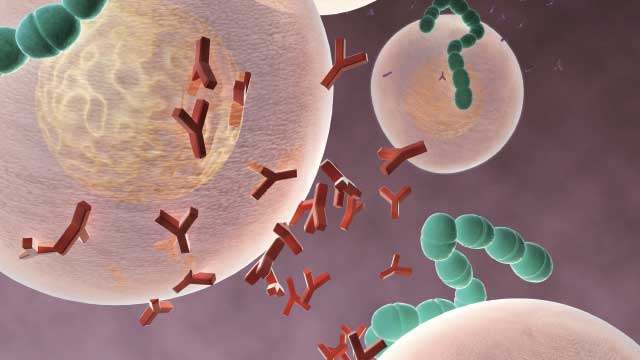Early action of IgA
Humoral immune responses play a critical role in protecting individuals against SARS-CoV-2 infection, particularly through the activity of neutralizing antibodies. Sterlin et al. measured humoral immune responses in the serum, saliva, and bronchoalveolar lavage fluid of SARS-CoV-2–infected patients who experienced a range of COVID-19 disease severity. IgA antibodies dominated the early SARS-CoV-2–specific antibody response compared with IgG and IgM concentrations in these fluids and was associated with expansion of IgA plasmablasts with mucosal homing characteristics. IgA serum concentrations peaked 3 weeks after symptom onset but persisted for several more weeks in saliva, and serum IgA was more potent than IgG in neutralizing SARS-CoV-2. These findings highlight the potential role of IgA during early SARS-CoV-2 infection.
Abstract
Humoral immune responses are typically characterized by primary IgM antibody responses followed by secondary antibody responses associated with immune memory and composed of IgG, IgA, and IgE. Here, we measured acute humoral responses to SARS-CoV-2, including the frequency of antibody-secreting cells and the presence of SARS-CoV-2–specific neutralizing antibodies in the serum, saliva, and bronchoalveolar fluid of 159 patients with COVID-19. Early SARS-CoV-2–specific humoral responses were dominated by IgA antibodies. Peripheral expansion of IgA plasmablasts with mucosal homing potential was detected shortly after the onset of symptoms and peaked during the third week of the disease. The virus-specific antibody responses included IgG, IgM, and IgA, but IgA contributed to virus neutralization to a greater extent compared with IgG. Specific IgA serum concentrations decreased notably 1 month after the onset of symptoms, but neutralizing IgA remained detectable in saliva for a longer time (days 49 to 73 post-symptoms). These results represent a critical observation given the emerging information as to the types of antibodies associated with optimal protection against reinfection and whether vaccine regimens should consider targeting a potent but potentially short-lived IgA response.







